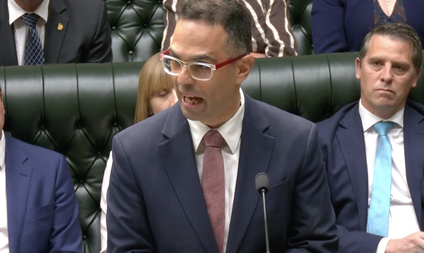A new Regional Development Trust Fund, overseen by an advisory council, will help stop pork barrelling and ensure regional communities get their fair share of funding, NSW Treasurer Daniel Moohkey says .
Mr Mookhey made the comments while handing down his first state Budget on Tuesday.
“We are putting an end to the politicisation and pork barrelling of regional development funding,” he told Parliament.
“(The) regional development trust fund will have rules to ensure allocations are transparent because need should matter more than political allegiances.”

The government says it will make a “starting investment” of $350 million into the fund.
A spokesman for Regional NSW Minister Tara Moriarty said other regional development funding will continue to be available from existing grants programs, but the Trust was the new ‘star in the family’ and would set new benchmarks of accountability.
“This is the initial step,” he told Government News. “There are other grant programs that are jointly funded with the commonwealth government that will continue … but in relation to state grants we see this as the new star in the family.
“This will be setting the benchmark and it’s where we’d eventually like to get a lot of grants rolled into.”
A new approach to regional funding
Regional NSW Minister Tara Moriarty said the trust, along with an overhaul of the Regional Development Act, represented a new approach to support for people in rural and remote parts of the state.
The announcements come after a series of damning reports into the administration of community grants under the previous government, including revelations that 96 per cent of quarter-of-a-billion dollar Stronger Communities grants pool went to coalition held seats – including $90 million to a single council.
A review by the NSW Productivity Commissioner last year also highlighted deficiencies in the administration of the program.
The trust will be guided by a Regional Development Advisory Council, which will provide governance and expert advice on funding decisions in line with the Commonwealth’s regional investment framework.
The council will also engage with communities on updating the existing 2004 regional development legislation so it can better deliver on its objectives of fostering economic and social growth.
Investment from the trust will focus on four key areas, including emerging industries, Aboriginal economic development, community infrastructure and regional services.
“These reforms to grant funding and the Regional Development Act demonstrate our government is putting the needs of regional people at the heart of our decision making. Our communities deserve this after a decade of waste, pork barrelling and poor results,” Ms Moriarty said.
“We are committed to ensuring rural, remote and regional communities not only get their fair share but that we are making a real and positive difference to their lives, towns and businesses.
“We are also committed to distributing funds to where they are needed most.”
According to the Productivity Commissioner’s report, the NSW Government normally spends about $4 billion each year on grants but that figure had blown out to $10 billion in response to COVID-19 and natural disasters.





If the government was serious about helping the regions grow and prosper, it would reinstate vital rail passenger services across the board. The future of NSW does not lie in Western Sydney, it lies in the regions. And all it would take is for the government to provide the incentive needed to encourage people to move out of the city and settle in regional towns and cities. And that incentive is rail passenger services. But while there is little or no public transport available, there will be no progress out here. We need our rail motors back on the tracks to connect outlying towns with larger regional centres so people can commute to work, go to the shops, take up study courses, attend medical appointments, do personal business and have a social life. But while the government sticks to only providing public transport in the city and ignores similar needs in the regions, growth and prosperity in this state will simply stagnate.